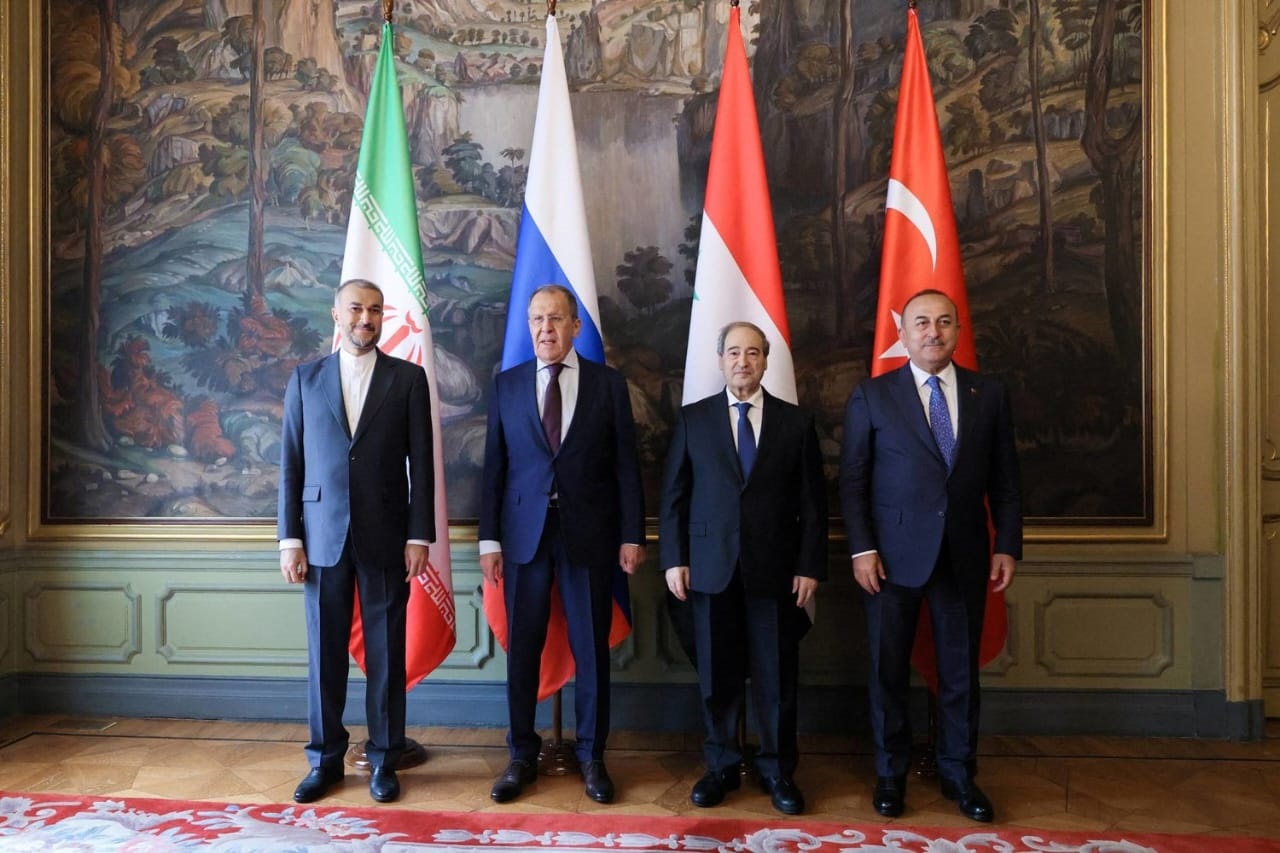Officials from Syria, Turkey, Russia, and Iran have been engaging in ongoing meetings to strengthen the prospects of improving the relationship between Syria and Turkey. The most recent of these meetings took place in Moscow on May 10th, involving the foreign ministers of the four nations. Notably, this marked the first meeting between the Syrian and Turkish foreign ministers since the outbreak of the Syrian crisis in March 2011.
While these meetings themselves indicate the presence of an opportunity for understanding between Ankara and Damascus, it is important to recognize that they do not provide the ultimate solution. Even if steps are taken to strengthen this rapprochement, such as the recent agreement in the meeting for deputy foreign ministers to create a “roadmap” for developing relations between Syria and Turkey, it does not negate the fact that the unresolved disputes between the parties remain significant and cannot be easily resolved.
What is noteworthy in this context is that the meeting between the foreign ministers in Moscow took place merely four days before the Turkish presidential and legislative elections. Regardless of whether President Recep Tayyip Erdogan succeeds in renewing his presidential term or not, the decision to hold the meeting during this period indicates a shared message that both sides aim to convey. Specifically, it suggests that altering the current approach to managing bilateral relations may be the most favorable option at this stage, considering the recent developments on both domestic and international fronts. These developments include the shifting power dynamics in Syria, favoring President Bashar al-Assad’s regime, as well as the growing trend towards stability in the wider Middle East region.
Multiple Issues
Currently, there are several unresolved matters between Turkey and Syria that are anticipated to be key focal points in the roadmap being prepared by the foreign ministers following the Moscow meeting. The most notable among these issues are as follows:
- Facilitating the repatriation of Syrian refugees: A significant objective for Turkey is to enable the return of Syrian refugees, estimated to be approximately 3.7 million by some Turkish and international sources, although other estimates suggest a higher figure. Addressing this issue is crucial for Turkey, considering the strain it places on the Turkish economy, which is currently grappling with a challenging crisis. By seeking to enhance opportunities for rapprochement with Syria and altering the dynamics of its relationship with President Bashar al-Assad’s regime, Turkey aims to alleviate the burden posed by the refugee population, a task that proves daunting in the present circumstances.
The repatriation issue has emerged as a central topic in the interactions among Turkish political factions leading up to the May 14th elections, particularly with right-wing parties such as the “IYI Party” adopting anti-refugee stances. Within this context, various questions will persist among the involved parties and are expected to arise in upcoming meetings regarding the mechanisms and destinations for the return of the substantial Syrian refugee population. This is particularly crucial considering that numerous provinces and cities in Syria continue to endure the aftermath of a decade-long armed conflict, characterized by the widespread destruction of vital infrastructure.
From various perspectives, even if the mechanisms and locations for refugee repatriation are established, the Syrian regime itself is unlikely to readily accept their return. It may attach additional conditions to this process, such as seeking international recognition of its authority, perceiving the refugees’ continued presence in host countries as a bargaining chip to be utilized in the future. Consequently, the regime may view maintaining the refugees’ residency in these host nations as an option aligned with its current calculations, rather than facilitating their immediate return.
- The presence of the Turkish military in northern Syria is perceived by Syria as an “occupation” due to the absence of a formal request from the Damascus government for their entry, in contrast to the Russian and Iranian forces. Russia and Iran share a similar perspective, extending beyond the Turkish military presence to encompass the American military presence as well. Moscow, in particular, has intensified its focus on the American presence as part of its handling of conflicts with Western powers following the eruption of the Ukraine war. The Syrian regime remains steadfast in its insistence on the withdrawal of Turkish forces from Syrian territory as a precondition for initiating any normalization process between the two parties.
During his visit to Moscow and meeting with Russian President Vladimir Putin on March 16th, President Bashar al-Assad reiterated this stance by linking the prospect of arranging a meeting with Turkish President Recep Tayyip Erdogan to the complete cessation of Turkish military presence. He emphasized that he would only agree to meet with the Turkish President if Turkey unequivocally demonstrated its readiness to withdraw from Syrian territory, put an end to terrorism, and restore the situation to its pre-war state. It is important to note that Turkey’s policy toward developments in Syria is unlikely to undergo any substantial changes unless security arrangements are established to address potential threats arising from the ongoing activities of armed Kurdish militias near its borders. This includes the establishment of a safe zone extending 30 km inside Syrian territory.
- The issue concerning Idlib represents a complex and unresolved challenge that may transform into what can be referred to as a “highly sensitive matter.” The province of Idlib has become a safe haven for terrorist organizations and armed factions, presenting a considerable obstacle. This situation has arisen particularly following the implementation of de-escalation agreements in various Syrian regions in the previous phase. Divergent approaches between Turkey and Syria regarding the handling of this matter further complicate its resolution. The Syrian regime favors a security-oriented solution, while Turkey opposes such an approach due to its close relations with certain groups. As a result, Turkey has engaged with Russia to avert military intervention as an option for addressing this intricate issue.
- Approach towards the Kurds: Turkey has begun conveying messages to the Syrian regime and relevant parties, emphasizing that its potential rapprochement with the regime will come with conditions. Turkey specifically demands clarity regarding the regime’s stance on Kurdish militias, specifically the Kurdistan Workers’ Party and the “Syrian Democratic Forces” (SDF), which Turkey designates as terrorist organizations. This aspect reflects one aspect of Turkey’s approach to potential reconciliation with the Syrian regime, emphasizing that such reconciliation can only occur if the regime adopts a policy consistent with Turkey’s positions and interests concerning these organizations. Given the ongoing tension and escalation between Ankara and these Kurdish groups, it is anticipated that this tension will persist, especially as Turkey carries out military operations in Iraq and Syria with the objective of “neutralizing” certain leaders and members within these groups.
The Limits of Change
Given the existing circumstances, it can be asserted that achieving understandings and preparing the ground for normalized relations between Turkey and the Syrian regime will prove challenging. The ongoing unresolved issues between the two parties exert reciprocal pressures and impose limitations on the feasibility of reaching comprehensive understandings, at least in the near future. Thus, the agreement among the foreign ministers during the Moscow meeting to task their deputies with crafting a “roadmap” for enhancing relations between Syria and Turkey can be viewed as the initial step on a lengthy path of negotiations between the two sides. This path aims to eventually reach a resolution for the existing disputes.


